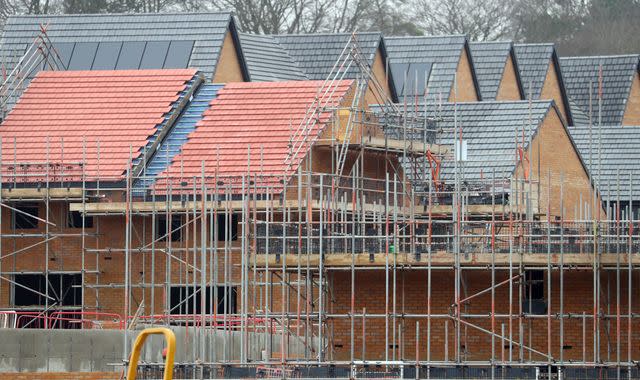Biggest housebuilder Barratt cuts target just as Labour promises more homes

One of the very few specific targets that the Labour Party set itself in its election manifesto was a promise to "get Britain building again, creating jobs across England, with 1.5 million new homes over the next parliament".
Rachel Reeves, the new chancellor, laid out earlier this week how the new government plans to achieve this target, equivalent to building 300,000 homes a year, a total not achieved since the 1960s.
Mandatory local targets on housebuilding - abandoned by Michael Gove, the former levelling up, housing amd communities secretary, amid pressure from Conservative backbenchers - will be restored, while planning restrictions on developing parts of the green belt will be relaxed. The new government has also made clear it will "not be afraid" to overrule local authorities.
It's all ambitious stuff.
Money latest:
£2 pasta that Michelin chef says you should switch to
But setting targets is very different from actually hitting them - as was highlighted in Wednesday morning's trading update from Barratt Developments.
The UK's biggest housebuilder by volume and third largest by stock market valuation said today it is likely to build fewer new homes during the next year.
Barratt expects to build between 13,000-13,500 homes during the 12 months to June next year, including 600 units from joint ventures. That would represent a drop of up to 7% from the 14,004 homes it completed during the year to the end of June.
And while that total of 14,004 for the most recent financial year was at the top end of Barratt's forecast range, that in itself was down by some 18.6% on the 17,206 homes that the company completed in the 12 months to the end of June last year.
Barratt blamed that on muted demand from July to September last year - a period during which the Bank of England's main policy rate rose from 4.5% to the current 5.25%.
The company also said that its average selling price fell from £319,600 during the year to the end of June 2023 to £307,000.
There was little news on Barratt's planned £2.52bn takeover of Redrow other than a reiteration that the deal would create "an exceptional UK housebuilder". The takeover is currently being reviewed by the Competition and Markets Authority with a "phase 1" decision due on 8 August.
The statement underlines how hard it will be to reach the government's stretching new target - and is in keeping with recent announcements from elsewhere in the sector.
Taylor Wimpey, the UK's biggest housebuilder by stock market valuation, said in April it expects to complete 9,500 to 10,000 new homes this year, excluding joint ventures, down from 10,848 last year and 14,154 in 2022.
Berkeley Group, the UK's second biggest player by stock market value, declined last month to offer a forecast on how many homes it expects to complete during the current financial year - but, in the year to the end of April, it delivered 3,521 new homes, down from 4,043 in the previous 12 months.
And Persimmon, the fourth largest player by market value, said in April it expects to complete between 10,000-10,500 homes this year - a modest increase on the 9,922 completed last year but still well down on the 2022 total of 14,868.
These numbers reflect caution on the part of housebuilders over the last 12 months. Barratt made clear today that the slowdown it signalled today reflects "the profile of land acquisition over the past 24 months".
Meanwhile, Rob Perrins, the Berkeley chief executive, told analysts last month: "We have not invested in new sites, but are ready and able to do so once the conditions for growth return."
Persimmon, too, has been buying less land. It said in April that it spent £145m on land during the first three months of the year - down one-sixth on the same period last year.
Caution, in other words, abounds.
None of this is to say that the housebuilding sector is not supportive of the new government's aims. Quite the opposite. Most housebuilders had little time for Mr Gove, not only for abandoning housebuilding targets, but also for the way he strong-armed the industry into contributing towards the post-Grenfell drive to make cladding on buildings safer while, seemingly, letting building materials suppliers off the hook.
So Labour - whose election last week delivered a bounce in housebuilding shares the following morning - will find a willing partner in the industry.
Read more from Sky News
Samsung union steps up pay fight with indefinite strike
What is the national wealth fund and why is chancellor launching it?
Barratt made that very clear in its statement today, saying: "We welcome the new government's urgency and focus on housebuilding and reform of the planning system as key to both unlocking economic growth and tackling the chronic undersupply of new homes.
"We look forward to working with government and wider stakeholders to address supply side constraints and deliver the new homes, of all tenures, the country needs."
Planning reforms are only one part of the jigsaw, however. A clutch of mortgage lenders, including Halifax, Nationwide, Barclays, HSBC and Santander, have started to cut their rates in the last few weeks.
But an interest rate cut from the Bank of England next month would probably provide a bigger boost still to the confidence of would-be homebuyers.


